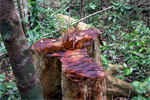
Deforested area in Madagascar in the western watershed of the Bay of Antongil. Photo by: Rhett A. Butler.
This weekend around 500 people showed up for a rally and concert in Nashville, Tennessee. The rally was in support of Gibson Guitars, a US-company currently under investigation for allegedly importing illegally logged wood into the country, an action that breaks a recent bipartisan amendment to the Lacey Act. While the Tea Party-affiliated groups that held the rally were expressing frustration with perceived over-regulation by the federal government, the issue at stake—a global effort to help stem illegal logging—was actually overlooked by the organizers.
Gibson Guitars has been raided twice; while no charges have yet been leveled, the music instruments company is suspected of knowingly importing illegally logged wood from Madagascar and unmilled wood from India, which breaks local laws as well. The 2008 amendment to the Lacey Act prohibits the sale and trade of wood products that are known to be illegally sourced, holding importers responsible for ensuring that the raw materials they use have been sourced under the laws of their country of origin.
Gibson Guitars says it is innocent in the case of the unmilled wood from India, arguing the problem is with the tariff coding of the product, done in India, not with the US-company. However, the question is whether or not Gibson knew that local sources were switching tariff codes in order to export a product that shouldn’t have been. Gibson Guitars, however, says that since the wood was certified by the Forest Stewardship Council (FSC), it is clearly legal. Yet the Lacey Act has its own measure of legality apart from the FSC, an independent certification group that has also faced deep criticism over its policies. While the India issue may be muddled, the Madagascar wood that constituted the first raid on Gibson Guitars is more concrete.
The issue of illegal logging has become paramount to Madagascar in recent years. Home to tens of thousands of unique species, as well as deep poverty, the African island nation has suffered under a recent illegal-logging crisis. Taking advantage of a government coup in 2009, armed gangs—often funded by foreign traders—logged imperiled species of tropical hardwood, including rosewood and ebony. Logging occurred even in national parks. The sudden rise in illegal logging has also been linked to the slaughter of endangered lemurs for bushmeat.
 Female Coquerel’s Sifaka (Propithecus coquereli) with baby. Lemurs are found only in Madagascar, but the island-nation contains over 100 species. The Coquerel’s Sifaka is listed as Endangered by the IUCN Red List, largely due to deforestation. Photo by: Rhett A. Butler. |
But illegal logging doesn’t just imperil endangered species, it also hurts local economies that see their natural resources destroyed and sold off. It is estimated that around 70 percent of people in Madagascar suffer from malnutrition. Two-thirds of the population live below the international poverty line, making less than $1.25 a day. Little is paid for raw logs in Madagascar, but by the time the material is shipped abroad and crafted into products, their value skyrockets: a single rosewood bed can cost $1 million. A recent investigation by the Environmental Investigation Agency (EIA) found that only 1 percent of the value of the logs stayed in Madagascar.
“These things are being sold for a lot of money and the people here are not getting much out of it. We’d like it to be more sanctioned and more controlled so we can save our forests,” Razia Said, a musician and an organizer of the concert in Madagascar, recently told the AP. Last weekend, Said helped organize a concert in Madagascar in support of the nation’s forests.
At the Tea Party rally in Nashville this weekend, however the focus was not on forests.
“This is not about conservation or illegal logging, to my knowledge,” CEO of Gibson Guitars Henry Juszkiewicz told the press, as reported by the AP.
Instead, for attendees, the issue was largely criticism over the role of the federal government.
“If the government is going to target Gibson today, whose business are they going to raid tomorrow?” Cookie Bowers, 64, told The Tennessean. Cookie and her husband drove ten hours to attend.
“Every American business should not fear the federal government showing up at their front door with guns drawn,” organizer, Ben Cunningham said, failing to acknowledge that agents in the Gibson Guitars raid did not have their guns drawn.
Others criticized such regulations for holding back job growth. However, the amendment to the Lacey Act was passed in part to help American jobs. Illegal logging floods domestic markets with cheap foreign wood products, making it difficult for local suppliers to compete.
“We need the protection of the Lacey Act. We need a fair playing field. Our small, little companies cannot compete with artificially low prices from wood that comes in illegally […] This is our Jobs Act,” Mark Barford with the National Hardwood Lumber Association said in Grist.
Juszkiewicz seemed to agree, telling the press that environmental regulations were necessary: “I don’t see any solution to the depletion of natural resources without a law and without enforcement.”
He also distanced himself from the Tea Party in general, saying he was not a Tea Party supporter.
“But, you know, in this case, we’re in alignment,” he said. “It’s clear this is a government overreach and we’re together on that.”
However Juszkiewicz’s statements to the rally were less tempered than what he said to the press.
 Young girl in Madagascar. Photo by: Rhett A. Butler. |
He told the crowd, that “[they would] fight the injustice and unfairness together. We will fight, and we will make sure other companies do not face bullies with guns. With your help, we will make permanent changes.”
As the issue has become more well-known, rumors have spread, including that US Fish and Wildlife Service agents, the agency that enforces the Lacey Act, stormed the company with guns drawn and ready. Yet, the USFWS says agents did not have weapons drawn, but holstered. The agency requires such agents to carry a fire arm.
Rumors have also spread that musicians could have their instruments confiscated, but the USFWS has issued a statement denying that. The Lacey Act only applies to bulk imports, since it targets the supply chain of illegally-logged wood, not individual musicians.
Notably, Gibson Guitars has been the only musical-instrument company under investigation. A number of other companies have come out publicly to say that they have found it possible to make instruments without violating the Lacey Act.
Bob Taylor, the CEO of Taylor Guitars, says that people need to better understand why the Lacey Act is needed.
“I’ll say it before and I’ll say it again. If I could take any user of wood, whether it be a guitar player, or a purchaser of a dining room table, with me, on a trip to the forest of 2011 in many, many parts of the world, and let them see with their own eyes the state of the forests and the people living in them, I’d stake my last dollar on the fact that they’d come home and preach with a loud voice how deforestation has got to be stopped! You have to see it to believe it, and if you haven’t seen it, with your own eyes, you can’t argue against it. Period. I’m sorry, but that’s the truth,” Taylor said in a statement adding that, “we can be musicians, environmentalists, businessmen and women, law-enforcement, and importers and users of wood, in this post-Lacey time. All of us can exist together and make the world work better than it was working.”
The 2008 amendment to the Lacey Act to help counter illegal logging worldwide was approved with bi-partisan support, including from the Bush administration. Since the amendment to the Lacey Act, illegal logging has fallen worldwide.
Related articles
Tea party versus Madagascar’s forests

(10/02/2011) The Tea Party and the African island-nation of Madagascar are having dueling concerts over the issue of illegal logging, reports the Associated Press. A concert in Madagascar over the weekend was meant to highlight the problem of illegal deforestation in one of the world’s poorest countries. Meanwhile the Tea Party is holding a rally and concert on October 8th to support Gibson Guitar, a musical instruments company currently under investigation for breaking US law by allegedly purchasing illegally logged wood products from Madagascar.
Background: the Lacey Act and the Fish & Wildlife Service raid on Gibson Guitars
(09/02/2011) On 24 August 2011, agents of the Fish & Wildlife Service (FWS) raided Gibson Guitar facilities in Nashville and Memphis, Tennessee, seizing ebony and rosewood material, guitars and guitar parts as evidence of suspected violation(s) of the U.S. Lacey Act. The Lacey Act is a long-standing anti-trafficking statute which prohibits commerce of illegally-sourced wildlife, plants and wood products from either the U.S. or other countries.
Endangered species trafficking: What did Gibson Guitar know?

(07/07/2011) A motion filed last month by the U.S. Department of Justice alleges Gibson Guitar knew it was trafficking in endangered timber when it was busted by the U.S. Fish and Wildlife Service in November 2009, reports the Environmental Investigation Agency (EIA).